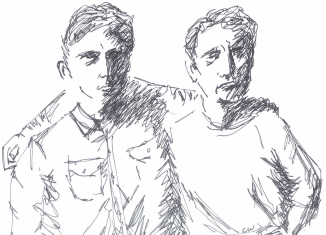 The coroner’s verdict is in: Peaches Geldof died of a heroin overdose. This tragedy has left two young sons without a mother and an entire extended family without the woman described by her father as “the wildest, funniest, cleverest, wittiest, and the most bonkers of all of us.”
The coroner’s verdict is in: Peaches Geldof died of a heroin overdose. This tragedy has left two young sons without a mother and an entire extended family without the woman described by her father as “the wildest, funniest, cleverest, wittiest, and the most bonkers of all of us.”
And yet, at this very moment, there are morbidly obese workaholic smokers smirking at this latest bit of internet ‘gossip’, smug in their own judgement of a woman they never met, never even heard of until her death. “How could she chose heroin over her own children?” they troll, oblivious to the irony.
The only difference between smoking a cigarette and shooting up is how long it takes to devastate your system as a whole. All for what? A temporary neurotransmitter buzz? Ah, but that’s the trick of addiction. It feels like so much more.
Disease or choice? When there are reasonable rhetorical arguments on both sides of any debate, logic dictates that there is space for an alternative conceptual model. Let’s go back to Aristotle and identify an addict by what they repeatedly do. Time and time again, an addict will chose their insatiable over everything and everyone they have previously professed to love. And that’s OK, actually perfectly reasonable. From their cognitive paradigm, it’s inevitable. Admitting this plain, if painful, fact begins to relax the cognitive dissidence that so often traps an addict within their fantasy. Addiction, a complex sequence of neurobiological interactions through time, is actually refreshingly simple to explain.
Addiction changes the vocabulary of your internal monologue – because it directly alters your system state, thereby your viable world, and even your own history.
While certain brains – impulsive, sensitive, creative, intelligent – are structurally more susceptible to addiction because of their innate flexibility (Bob Geldof’s quote about his daughter is quite telling), anyone can get hooked on a substance or behaviour, especially after physical/sexual/psychological trauma. Introduce a chemical or act that causes neurotransmitter bliss (or release from discomfort) and, provided the negative consequences don’t immediately trump the reward, your thinking begins to accommodate and adapt to this new working solution.
If you ever try (or do) something that triggers this specific thought: “This is the best feeling ever – I need to do whatever possible to keep this going for as long as possible.” Be VERY careful. This is why, for so many of us, foreplay is never enough. This is why one drink is too many for an alcoholic. Your logic skews to internalize this ‘truth’ and restructures your perception of reality to support these new priority permissions. Past traumas become more painful – the memories will actually alter. Physical pain becomes more pronounced. Even daily strife seems more apocalyptic. Eventually, the addiction gets tied into survival itself, deep in your limbic brain. Then you’re really screwed, because to dislodge it you’ve got to break that bond by pushing your insatiable to its be-all-end-all limit. Rock bottom isn’t a catch phrase; it’s a biological event.
Asking an addict to give up his/her insatiable of choice is asking them to live a life of less-than, of deliberate ‘missing out’, in a universe of mocking abundance. It’s counterintuitive and downright abusive. Because, as addiction alters the chemical landscape of the brain, what used to be enough… just isn’t. Not doing drugs, or even not wanting to do drugs isn’t the answer. An addict must be coached how to rehabilitate their brain until they actually, on all levels of cognition and emotion, want to want not to do drugs. How? I certainly don’t have all the answers, but stay tuned to upcoming posts for some innovative Blank Canvas Living ideas, techniques, and exercises.
I believe Peaches Geldof, an admitted perfectionist with a creative brain prone to obsessiveness (documented eating disorders and – well intentioned – attachment parenting), was looking for her Secret Garden. And in this society, aren’t we all? For Peaches, a lifetime of unhealthy observed and inherited brain patterns, exaggerated by addiction, kept leading her back to heroin – the universal good mother. It wasn’t supposed to kill her, just give her a break, a rest, an ugly-edged bliss in a viable world that must have left her feeling constantly on-edge, never good enough. I don’t blame her. Not because she had a disease, but because she never knew she could create a choice.






